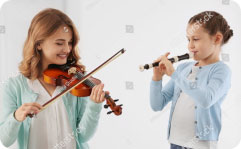For kids
Top Instruments For Beginners: Which One Should You Choose?
Choosing the right musical instrument as a beginner can be a daunting task. With so many options available, it’s easy to feel overwhelmed. Each instrument has its own unique set of characteristics, benefits, and learning curves.
Below, we highlight some of the best instruments for beginners and offer guidance on how to make the best choice for your musical journey.
- Piano
The piano is often recommended for beginners due to its straightforward layout and versatility. Its keys are arranged in a linear fashion, which makes it easier to understand musical concepts such as scales and chords. Learning the piano can provide a strong foundation for understanding music theory and can be beneficial if you decide to learn another instrument in the future. Additionally, the piano’s wide range of sounds makes it suitable for various music genres, from classical to contemporary.
- Guitar
Guitar lessons in Singapore are also slowly gaining popularity for beginners. The instrument’s relatively portable and can be used to play a wide range of musical styles, including rock, pop, blues, and folk. Guitars come in two main types: acoustic and electric. Acoustic guitars are great for beginners as they don’t require additional equipment like amplifiers. Electric guitars, while slightly more complex due to the need for an amplifier, offer a different range of tones and are ideal for those interested in rock or metal music.
- Violin
The violin is a string instrument that offers a rich, expressive sound. It’s a bit more challenging for beginners due to the need for precise finger placement and bowing technique. However, the violin is a rewarding instrument that allows for great emotional expression and is fundamental in genres such as classical, folk, and even contemporary music. If you’re interested in orchestral music or solo performance, the violin might be the right choice for you.
- Drums
If you have a natural sense of rhythm and enjoy keeping the beat, the drums might be the instrument for you. Drum lessons can be a fantastic way to develop coordination and timing. Beginners often start with a basic drum kit, which can be expanded as skills improve. Buying your first drum kit is also a great way to relieve stress and improve overall physical fitness. However, it’s important to consider that drum kits can be noisy and may require practice in a soundproofed space.
- Flute
The flute is a woodwind instrument known for its sweet, melodic sound. It is relatively easy to start playing and does not require a lot of physical strength, making it a good choice for young beginners. The flute’s portability is also a plus, allowing you to practice in various locations. While it does require some breath control and finger dexterity, these skills are developed gradually, making the flute an accessible and rewarding instrument for many beginners.
- SaxophoneM
The saxophone is a unique and versatile woodwind instrument. Its rich, vibrant tone makes it a standout in various music genres like jazz, classical, and pop. Learning the saxophone involves mastering the use of keys and embouchure (the way you shape your mouth around the mouthpiece). Interestingly, for some beginners, the saxophone might actually be one of the easiest instruments to produce a sound on. Despite its complexity in other areas, the initial sound production can come more naturally compared to some other wind instruments. This, combined with its distinctive sound and adaptability, makes the saxophone a popular and approachable choice for many aspiring musicians.
- Ukulele
The ukulele is a small, four-stringed instrument that’s easy to learn and play. Its small size and light weight make it particularly appealing to beginners and younger students. The ukulele has a cheerful, bright sound and is commonly used in Hawaiian and popular music. It’s a great instrument for those looking for something fun and less intimidating than the guitar or piano.
- Bass Guitar
The bass guitar, often the backbone of a band, is responsible for providing the harmonic foundation. It typically has four strings and is tuned an octave lower than a regular guitar. Learning the bass guitar can be a great way to understand rhythm and harmony, and it’s essential in many music genres. While it’s similar to the guitar in terms of technique, its role is distinct and crucial for many musical ensembles.
Choosing the Right Instrument
When choosing an instrument, consider your personal interests, physical attributes, and musical goals. Think about the type of music you enjoy and the instrument that will best suit your lifestyle and learning style. It’s also helpful to try out different instruments if possible, as hands-on experience can often clarify which instrument feels right for you.
Conclusion
Embarking on a musical journey can be an exciting and fulfilling experience. At Da Capo Music Academy, we understand that choosing the right instrument is just the beginning. Our dedicated instructors are here to guide you through every step of your musical education, from selecting the perfect instrument to mastering it.
Whether you’re interested in piano, guitar, or any other instrument, Da Capo Music Academy offers personalised lessons tailored to your needs. Visit us at Da Capo Music Academy to start your musical adventure and discover how we can help you achieve your musical goals.








